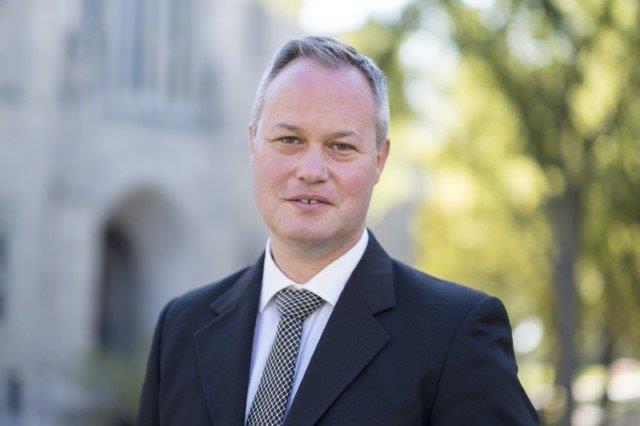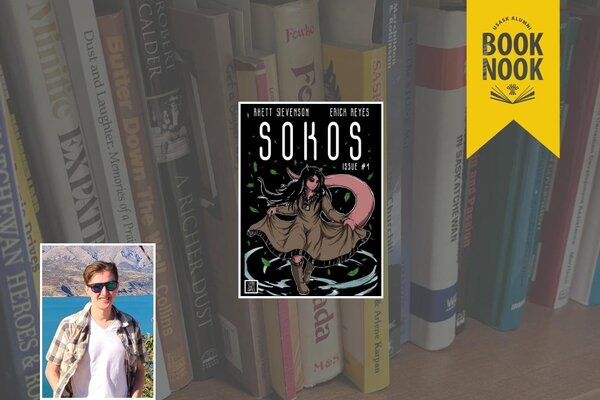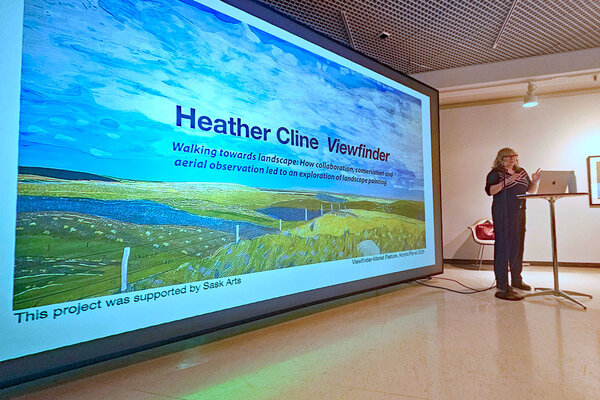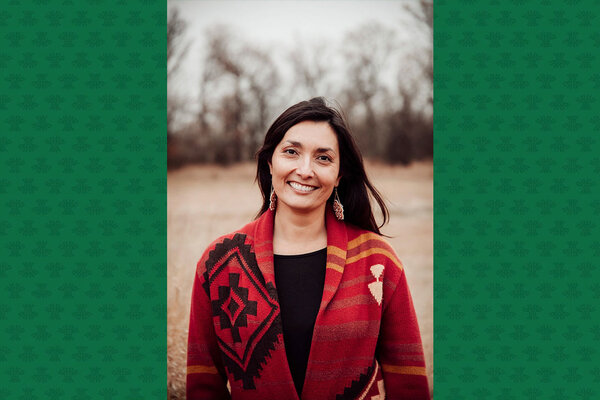
Alumnus who helped found RUP program celebrates its 50th anniversary
Gordon Tweddell (BSc'70) was an undergraduate student in the late 1960s with a passion for planning
By Shannon Boklaschuk
A University of Saskatchewan alumnus who was instrumental in the development of the regional and urban planning (RUP) program 50 years ago came back to his alma mater to celebrate the milestone anniversary with students, faculty, alumni and staff.
Gordon Tweddell (BSc’70), who studied geography through the College of Arts and Science at the U of S, was invited to Saskatoon to give an address during the regional and urban planning program’s 50th anniversary banquet on Sept. 17, 2018. The banquet was organized to be held in conjunction with the Saskatchewan Professional Planners Institute annual conference.
In the late 1960s, Tweddell was among a group of faculty, students and administrators who rallied to create a planning program at the U of S. The program really began to take shape when Tweddell, who was an undergraduate student at the time, worked with faculty and administrators to ensure the concept would ultimately be implemented.
However, Tweddell remained humble about his historic role in promoting the program when invited to the banquet by U of S professor Ryan Walker, from the Department of Geography and Planning.
“I had vague memories of suggesting the idea; however, my overwhelming feeling was of humility, because credit belongs to the senior university officials who made the program a reality,” said Tweddell.
“They were people who lived through the deprivations of the Great Depression and the horrors of World War II, yet those events did not dim the optimism and foresight necessary to build institutions like the U of S.”
Walker pointed to a memo from the late 1960s that was recently uncovered when Sharla Daviduik from the College of Arts and Science conducted archival research into the origins of the RUP program. Walker noted the university’s Saskatoon campus principal at the time, Robert Begg, wrote to Robert Haslam, then the dean of the College of Arts and Science, that he had met with the young Tweddell concerning “the offering of instruction in urban planning and development.”

“Tweddell got considerable support for his proposal, and I think the matter deserves serious consideration, particularly in view of the amount of work which Tweddell has already done,” wrote Begg. “I must say I consider that this is the type of approach from students which we must examine very carefully, and from which we can obtain considerable benefits.”
Another student referred to in the 1960s memo—the late Kent Gerecke—went on to graduate from the U of S with a Bachelor of Arts degree in 1969. Gerecke then completed a master’s degree and doctorate in planning and became the head of the Department of City Planning at the University of Manitoba.
“Dr. Gerecke was one of Canada’s most prolific, influential and highly regarded planning scholars. I was so pleased when Sharla shared this reference to his and Mr. Tweddell’s roles in shaping the U of S planning program,” said Walker.
“I read Gerecke’s work when I was in planning school. Prior to seeing the memo from Principal Begg, I had no idea Gerecke got his start at the U of S and that he helped initiate our program while he was a student here. I can see why historians get such a kick out of their research.”
Walker said the Department of Geography and Planning invited Tweddell to speak at the 50th anniversary event as “a way to animate our history, from the yellowed pages of archival documents to a man who not only had a significant role in our program’s origin, but who has also had a tremendous career and life after the U of S—something we can all draw inspiration from.”
In an interview prior to the banquet, Tweddell said he sought the development of a regional and urban planning program at the U of S because that was what he was passionate about studying as an undergraduate student. He noted faculty throughout the university at the time were also interested in planning and related subject areas.
“These were all brilliant people, and when I talked to them about it they seemed to agree that it was something worthwhile,” Tweddell recalled.
Tweddell said that his late father, Ian William Tweddell (BE’48), was a civil engineering professor at the U of S who was also interested in planning and engineering. However, Gordon Tweddell, a Saskatchewanian who was raised in Saskatoon and who now lives in Victoria, B.C., believes his interest in planning developed independently from his father’s influence.
“I think what university did for me was it sparked a curiosity for many different subjects,” said Tweddell. “And having that curiosity focused on a broad discipline like planning, it opens up all kinds of career opportunities.”
Gordon Tweddell went on to earn a master’s degree at the University of British Columbia and worked as a community planner for 15 years in Saskatoon, Vancouver and Edmonton. He also found that his planning skills were transferrable to senior management positions in the private sector, including a role as director of corporate strategic planning with TELUS.
Later, through his work at Bell Labs and its successor organizations such as SAIC, a national defence and intelligence contractor, Tweddell had the opportunity to be part of the future of the telecom and information technology industries and reflect upon their impact on communities and society.
Tweddell believes it’s important to think about the future. He noted that planners always work to accommodate growth, but perhaps, in the near future, the emphasis will change to creating enduring quality in our communities, he said.
“Most recently, as a board member and now advisor to the Greater Victoria Harbour Authority, I have seen the need for coordination across industries, organizations and governments,” he said. “Our communities are part of a global web of interdependencies. Nurturing those relationships will ensure continued support and relevance of our plans and the success of communities in a globally competitive environment.”
Walker said the U of S has one of the best undergraduate planning programs in Canada, and it will remain so “as long as we hold on tight to our interdisciplinary roots and keep one eye on continuous improvement.”
When asked about the RUP program’s highlights during the past 50 years, Walker noted that 50 years is a long period of time from which to choose.
“In the last decade, though, some of the greatest highlights have been in our commitment to a studio-based teaching style, complemented by other forms of experiential learning. By studio-based I mean almost half of our planning courses are structured around real Saskatchewan community planning projects. We’ve had teaching partnerships with the City of Melfort, the rural municipalities of Corman Park or Aberdeen, with Indigenous communities and countless projects in Saskatoon,” he said.
“Each of our core faculty members and professional associates are committed to linking the classroom to the community. In addition to that studio-based approach, we have a tradition of international field courses, ranging from courses in Prague, to Chiapas and, next year, Copenhagen. And we’re even engaging with our alumni this way. We just finished going on our first-ever RUP alumni trip to New York City. Every two years we’re going to take a trip together to a different city. Our alumni are a blast and we really owe a lot to them and their continued involvement in our program.”


